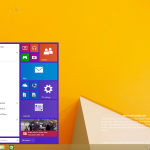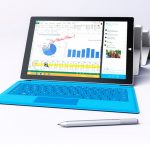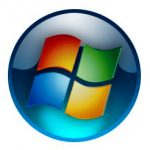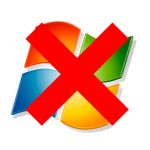Everything you need to know about Windows 9 ('Threshold')

At launch, Windows 8 was a mess. It was a brave and -- arguably -- necessary attempt by Microsoft to re-invent its operating system and keep it relevant as the world transitioned towards mobile computing, and tablets in particular. But the first release was seriously half-baked, and left many Windows users scratching their heads in confusion. Windows 8.1 improved things massively, and Update made the OS even better, especially for previously neglected keyboard and mouse users. But Windows 8.x’s poor market share tells a clear story -- the OS has flopped badly, and it’s time for Microsoft to chalk it up to experience and move on.
Windows 9 (aka Threshold) is expected to be the operating system that Windows 8.x should have been, just as Windows 7 was the OS Vista should have been. According to The Verge, we’ll get our first proper look at the next Windows iteration on September 30, but we already have a fairly good idea of what to expect.
Threshold: Windows for the Neanderthal set

What’s with all this excitement over Windows "Threshold"? I get it that Microsoft sort of fumbled the ball with Windows 8. I also recognize that the subsequent tweaks and retrofits (Windows 8.1, Windows 8.1 Update 1, Windows 8.1 Not-Update-2, et al) are viewed by many as "too little, too late" to save the product.
However, I’m sensing a deeper disturbance in the force here. When it comes to Windows Threshold, there’s a palpable aura of anticipation -- a kind of electric expectancy, and its emanating from what I like to call the "Neanderthal set".
Windows 8.x loses market share for second consecutive month

Windows 9 can’t come soon enough for Microsoft, as Windows 8.x continues to lose market share, according to the latest usage data from Net Applications.
Last month I reported that in June Windows 8.x had gone into reverse gear, losing market share for the first time, and posed this question -- "Statistical anomaly or downward trend?" It’s too early to call it a "trend" but anyone who expected the tiled OS to make a recovery in July will be disappointed by the latest set of figures. There’s a striking difference this time around too -- both Windows 8 and 8.1 show drops in July. Ouch.
Is Russia on the verge of creating its own controlled, closed internet?

The idea of a closed internet is hardly new; turn your eyes to East Asia, and the Great Firewall of China looms large. The Chinese government is well known for the control it likes to exert over the levels of access its citizens have to the internet, and there have been numerous well-publicized cases of censorship and access being restricted to pages that refer to certain events in the county's history. The country is highly defensive of its image, and goes to great lengths to fight off western influence -- including going as far as banning Windows 8 on government computers lest machines furnished with Microsoft's most recent operating system be used for spying on the People's Republic of China. Now it looks as though Russia could be going down a similar route.
Russian parliament has just passed a law that requires internet companies to store data about Russian citizens within the county's boundaries. The move can be viewed in a couple of ways. It is no secret that the Russian government, and Vladimir Putin in particular, is no fan of social media -- social networks were used by Russians to voice their disapproval at Putin's activities. It is thought that the move to contain citizen's data without Russia is a bid to create a Russian version of China's closed internet.
Windows 8.1 update woes? A fix is on the way

Take a look at the monthly market share stats for Windows and you’ll see a good proportion of Windows 8.x users are still on the original version of the tiled OS. For some it’s a matter of choice, for others it’s because they simply can’t update to Windows 8.1.
A large number of users have experienced the dreaded Blue Screen of Death when attempting to perform the update to Windows 8.1, which has resulted in them being unable to complete the process. Fortunately, Microsoft has a fix to address the issue.
AutoCAD 360 lands in Windows Store

Like Windows Phone, Windows 8.x does not get anywhere near the same level of attention as its more popular rivals, Android and iOS, receive from top developers. Still, the app selection has slowly gotten better, thanks in no small part to third-party offerings, reaching the point where it ticks all the right boxes for casual users.
But, Windows Store is also seeing improvements in its selection geared towards professionals. The latest major Modern UI offering to greet Windows 8.x is Autodesk's AutoCAD 360, which arrives as a free preview. This is a huge win for the platform.
Windows 8.x goes into reverse gear -- loses market share as both Windows 7 and XP show growth

I’ll be honest, although Windows 8.x losing market share is a shocking state of affairs -- and a new low for an operating system which has struggled since launch -- it’s something that’s been coming for a while. Windows 8 has been dropping share since Windows 8.1 arrived, and Windows 8.1 has been growing at such a glacial pace it was only a matter of time before the losses outweighed the gains, and that’s exactly what happened in June according to NetMarketShare.
In a month where Windows 7 and Windows XP -- the OS that refuses to die -- both gained market share, "new Windows" shifted into reverse gear and began shedding users.
Apple, Google and the kings of 'abandonware'

"Abandonware". It’s the scourge of the industry. Every time a vendor abandons a software product, a puppy dies. Or an orphan. Or a Java developer.
Regardless, nobody likes to see their favorite app/game/platform get left behind. It’s the worst kind of techie betrayal. You spend days, weeks or even months mastering a product only to have the virtual rug pulled out from under you.
Microsoft's Surface Pro 3 is better than Apple's MacBook Air -- here's 5 reasons why

Nowadays, if you buy a brand new laptop, it is hard to buy an absolute lemon. Unless you scrape the bottom of the barrel at Best Buy and get some god-awful $200 underpowered computer, you should be fine. Hell, even that inexpensive computer may meet some people's needs. However, some of us spend many hours of each day on a computer, so it makes sense to invest in something great. If you are reading BetaNews, I'm sure you fall into that category. If you ask me which computer to buy, I would recommend many (depending on budget), but two stand out among the rest.
The Microsoft Surface Pro 3 and Apple MacBook Air are great balances between portability, power and cost. Yes, there are more powerful computers, but they are often very heavy and have terrible battery life. Portability cannot be underestimated when it comes to a laptop's value and both of these machines are super thin and light. Last month, my colleague Mihaita pondered the question of which was better based on specs alone. However, as someone who has used both, hands-on, for long periods of time, I am ready to definitively tell you that the Surface Pro 3 is better. Do you agree?
Buying the Surface Pro 3? Here are the apps, games, programs and accessories you need

As someone blessed with the opportunity to try the Surface Pro 3 early, I can say it is truly a game changer. It is very light, has great battery life and a big beautiful display. The tablet/laptop hybrid is far beyond offerings by competitors, including Apple. If you even consider buying a Macbook Air over this, you are arguably making a huge mistake.
With that said, the Surface Pro 3 will begin hitting stores this Friday, June 20th. While the computer is great out of the box, it is not complete until you install useful apps and programs. But wait, aren't apps and programs the same thing? Yes and no. They are both pieces of software, but apps run in the Modern UI, and programs run in the classic UI. While Windows RT variants of Surface cannot install extra programs, the Pro 3 can, since it has an x86_64 Haswell processor. Below is a list of my suggested programs, apps, games and hardware accessories.
The most popular stories on BetaNews this past week: June 8 -- 14

Eyes were focused on Microsoft as the company held an Xbox One press conference at E3 2014, with the focus being very much on games. Not to be outdone, Sony also held a press conference at the event. Consoles from Sony and Microsoft are still largely reliant on traditional controllers -- dull! But the SteelSeries Sentry Eye Tracker is something to, almost literally, keep an eye on as it allows for controlling games with your peepers. PS4 users have the arrival of YouTube to look forward to, and Chromecast owners will soon be able to stream files from VLC.
In security news, AVG publicized details of yet another OpenSSL flaw. While less serious than other vulnerabilities that have been discovered recently, it's still something of a cause for concern. We're still feeling the fallout of the Zeus botnet, and F-Secure set up an online testing tool that can be used by anyone to check for the infection. One tactic used to attack websites is bombarding them with comment spam, and new research shows that 80 percent of such spam is generated by less than a third of site attackers.
The BEST Start button and menu choices for Windows 8.1

Whatever your reasons for switching to Windows 8.1 -- be it finally upgrading from XP, or the arrival of a new PC at home or work -- you’ll find "New Windows" a slightly alien place at first. You can action various changes to make it more like the OS you’re used to (boot to desktop -- soon to be the default -- and switching to the All Apps view are great first moves), but if you want a proper Start button and menu, you’ll need third-party help. Fortunately there are plenty of great choices available, including some excellent free programs like Classic Shell and IObit StartMenu 8.
Seasoned Windows 8.x users might sneer at you for "going back to the old ways", but there’s no question that if you use a keyboard and mouse and have limited interest in the Modern UI, a "real" Start button and menu can do wonders for your productivity. Here are our top 14 recommendations -- free and paid.
Microsoft patches Windows 8.x but leaves Windows 7 vulnerable, according to researchers

Around 50 percent of PC users are on Windows 7, while just 12 percent are running Windows 8.x, yet Microsoft is leaving the more popular OS vulnerable to zero day attacks by choosing to only patch the newest Windows version. That’s the findings of two security researchers who built a tool to compare 900 libraries in Windows 8 with their Windows 7 counterparts.
"If Microsoft added a safe function in Windows 8, why does it not exist in Windows 7? The answer is simple, it’s money -- Microsoft does not want to waste development time on older operating systems. They want people to move to higher operating systems," security researcher Moti Joseph claimed in a presentation at the Troopers14 conference in Heidelberg, Germany.
Android may get touch-friendly Office apps before Windows 8.x

Since his appointment as CEO in February of this year, Satya Nadella has made it clear that Microsoft needs to be more than a one-platform developer. Still, it may come as some surprise that the Android version of the latest touch-optimized Office suite will be released months before the Windows 8 variant.
Office's user base across PCs remains high, but in order to target mobile users, the majority of whom are on Android or iOS, the company is making a clear statement that it won't neglect these consumers.
China brands Windows 8 a threat to its national security

It’s fair to say China isn’t a fan of Windows 8. A few weeks ago, the tiled OS was banned from Chinese government computers, as part of a notice on the use of energy-saving products (if this sounds a bit vague, that’s because the reason given is).
Then, if that wasn’t bad enough news for Microsoft, a state-backed news report broadcast on China's CCTV has really put the boot in, branding the operating system a threat to China's cybersecurity, and suggesting it is being used to spy on Chinese citizens.
Recent Headlines
Most Commented Stories
BetaNews, your source for breaking tech news, reviews, and in-depth reporting since 1998.
© 1998-2025 BetaNews, Inc. All Rights Reserved. About Us - Privacy Policy - Cookie Policy - Sitemap.